Mr.Matt McAndrew,
I suppose that I didn't pay much attention to you in the beginning. My favorite was Ricky Manning, not least of all because I agree with Adam and he looks like Joaquin Phoenix.
I noticed that you sang Drops of Jupiter for your knockout, one of my all-time favorite songs, but since they didn't show it I didn't even learn your name.
Come top 20 eliminations, Ricky was gone. I needed a knew favorite. I am a fan of the Beach Boys, but I had never heard God Only Knows. I can honestly say that, though I looked it up after the show, I prefer your version and it continues to be my favorite performance of yours.
It wasn't long before I was hoping you would get through to the finals, because not a Monday or Tuesday night went by that I didn't want to hear you perform.
Your versatility was what really drew me in. I was positive that you could do anything: and you did. Through The Beach Boys, Train, Ed Sheeran, U2, and more, I only became more convinced that you would win. During finals week at my school I listened to the Blower's Daughter on replay because it was the only song that would calm me down.
You sang Bono! No one does that - but you did. Your voice is so pure that it is enough to make someone cry, to make them smile, to make them angry or want to jump up and go on an adventure, and there wasn't a soul in my family that wasn't blown away by your talent.
I want you to know that, hundreds of miles away in a little town in Michigan, there was a sixteen year old girl who has watched this show for years, who watched you get second place, and who knows that if there was ever someone on that show who deserved to win a record deal, it was you.
I watched you chart number one on itunes with a song that you yourself wrote, I watched you go up against two teammates with phenomenal voices and a man with the power to command the stage who ended up beating you, and I watched Adam take to you like I've never seen him take to one of his artists.
I wanted to watch you win.
There was no other contestant on that show whose album I would buy. When you open your mouth, you live every note and vicariously through you, so does everyone else. Adam never said a truer word than after your Somewhere Over the Rainbow performance: the whole world stopped spinning, just for a moment, to listen to something so pure and bittersweet.
So here is what I have to say to you: This morning I woke up and I prayed that you would have a better life than you ever imagined. I prayed that you would never accept America's decision that you were second best, and I prayed that I would get to hear your voice on a CD sometime soon.
A lot of talented people come and go on that show. I've heard Adam give promises that so far I've never seen come to fruition, but from that show there is no voice I'd rather hear than yours.
I prayed that, if Adam really cares, you'll get a check mark in that box.
Wednesday, December 17, 2014
Saturday, December 13, 2014
To the Talented Mr. Ridley
When I first saw the trailer for Exodus: Gods and Kings, I thought that, perhaps, this would be a film that told the true story of the Exodus. It looks to be a fantastic masterpiece, with stunning visual effects, impressive performances and most of all a movie that would bring the awesome power of God to the big screen,
We get it. Its hard to portray a Bible story to great magnitude. But you seem to have forgotten that it was a Bible story you were portraying in the first place.
You did well on some points. The detail and majesty of the sets and costumes overwhelmed me with the feeling of Ancient Egypt. Ramses was the best I've seen in a while; believable and pitiable, but also as easy to hate as the proud king in the Old Testament. You slipped up a bit historically - Ramses the Conqueror, he was called, and you made him look like an incapable military commander - but its simple to overlook that. His sweet family dynamic caused me to cry like a baby when the tenth plague came to fruition, and his chilling scene of "I am God" was one of the more memorable points in the film.
Speaking of the plagues, you did them well too. I felt heart-wrenching pity for the Egyptians; a line in the best Moses movie ever made came to mind as I watched the people suffering from the boils:
We get it. Its hard to portray a Bible story to great magnitude. But you seem to have forgotten that it was a Bible story you were portraying in the first place.
You did well on some points. The detail and majesty of the sets and costumes overwhelmed me with the feeling of Ancient Egypt. Ramses was the best I've seen in a while; believable and pitiable, but also as easy to hate as the proud king in the Old Testament. You slipped up a bit historically - Ramses the Conqueror, he was called, and you made him look like an incapable military commander - but its simple to overlook that. His sweet family dynamic caused me to cry like a baby when the tenth plague came to fruition, and his chilling scene of "I am God" was one of the more memorable points in the film.
Speaking of the plagues, you did them well too. I felt heart-wrenching pity for the Egyptians; a line in the best Moses movie ever made came to mind as I watched the people suffering from the boils:
All this pain and devastation, how it tortures me inside
All the innocent who suffer from your stubbornness and pride!
Truth be told, I was tempted to fall on my knees in the face of the might power of God portrayed so stunningly. There were, however, drawbacks. One would think that if crocodiles eating people had been the cause for the Nile turning to blood, it would have been mentioned in the Bible. The explanation of natural clay was starting to look very appealing after such a gruesome slaughter. Nevertheless, I was impressed by how you pulled off the plagues.
These high points being explained, I have a few questions for you: When was the last time you opened a Bible and actually read the story of the Exodus? With such rich content, did you really need to leave so much out and add so much in? Don't you know that the fundamental purpose of the Bible is to explain that God became human in the New Testament? Are you really happy with the way that you portrayed Him? With the way that you portrayed Moses? What about Miriam and Aaron?
Though I am a Catholic who is familiar with the story, this is not a critique of your theological methods. I am going to be pointing out only what is clearly said in the Bible.
Let's tackle these questions. Either you've never read the book of Exodus or you chose to ignore some of the most fundamental basics. You mixed up the motives for the slaughter of the innocents in the gospels and the motive for the Egyptians. You just had to drag in prophecy, decades before the prophets even existed. Miriam's mother raised Moses, not Miriam herself. She never became Egyptian, and she most certainly did not stay in the city while her people left. You ignored one of the most important people in Moses' life, and instead gave us Joshua. While this was an interesting tidbit, in the original books Joshua is not even mentioned until Moses is already dead. You also gave Aaron a wee role as Moses' left hand man. What you (and for some reason most other directors of Moses films) have also neglected to tell is the story of Moses' inability to "speak well" and God tasking Aaron to be the spokesperson to Ramses. It is such a rich detail that could bring Aaron's character into the light. Instead, you have chosen to let Moses come into greater character detail, which really didn't help the character at all.
Since when did Moses abandoned his family so that he could go to Egypt and perhaps never see them again? And going by that standard, since when did he blame God for abandoning them, and since when did God throw the blame right back at Moses? It all could have been avoided in this very simple Bible verse: Exodus chapter 4 verse 20: "And Moses took his wife and sons and set them upon an ass, and he returned to the land of Egypt; and Moses took the rod of God in his hand." Did you just want the drama of it all? You could have spent longer on their courtship if more romance was what you wanted. As my friends and I talked after seeing the movie, one of them mentioned the scene by saying "and suddenly, four seconds later he's marrying Zipporah."
Speaking of time passing quickly and Moses' staff, here is the list of main things you removed:
- The Staff turning into a snake and devouring the snakes of the high priests
- Moses raising his staff to perform miracles
-Aaron's part (already discussed)
- The pillars of cloud and fire to lead the Israelites
- The pillar of fire attacking the Egyptians
- The songs of praise of the Israelite women (led by the neglected Miriam)
-Moses killing the Egyptian slave driver (the original reason he got exiled, by the way)
Such amazing visuals these could have made! The richness that they could have added to the story! Instead, you added parts that were unnecessary and most of which were certainly not in the Bible:
-Ramses almost cutting off Miriam's arm
-A prophecy about a leader that tensed things in a totally random fight with the Hittites
-Guerrilla Warfare and Sabotage
-Hanging of families
-Moses hiding
-Half of Ramses' army falling off of a cliff
-Moses getting lost
-The significance of an Egyptian sword; the significance of which no one understood
- The Golden Calf, the Ten Commandments and Moses dying
- Pessimistic Moses
Presumably the reason for the Israelites' attempts at warfare was because you just wanted to blow something up. Shoving 40 years of wandering without explaining it into the last five minutes of an already too-long movie, was that your idea of finishing the story? It would have done far better to have it end with Ramses' skeptical, forlorn murmur of "Ramses the Great?", seeing as Ramses was the best character anyway. Instead, we got treated to Moses bringing up a problem of disunity between tribes, a problem that didn't even come to fruition until circa 922, after the death of Solomon, and a very grouchy paraphrase of "if we ever get to the promised land", a sentence that you did not care to explain led to 40 years in the desert. Perhaps you thought we already knew the story. I think it was just more obvious that you didn't. I was actually surprised that you added the burning bush, because it had taken so long for it to appear. Not, however, so surprised and more importantly deeply annoyed at the way that you brought God into it.
We understand, Mr. Scott. Its a great challenge to portray God. You probably didn't want to do just a voice out of nowhere (though that is how it is in the Bible) because you wanted to be different. Understandable, but nonetheless vastly preferable to a bratty 8 year old with a British accent, building rock castles and grinning devilishly. You portrayed God as a child who 1) Doesn't seem to know who Moses is and talks to him as a mentor to his student at best, like an old friend at worst 2) Likes to serve tea Chinese guru fashion and acts like a human, something that, as I already mentioned, doesn't happen until the New Testament 3) Is a kid in the first place - when God appears in the Old Testament, they say how he appears. A pot, a flame, a voice. But never as a child. 4) Someone without love who wanted revenge on the Egyptians. A child killer, just as Ramses said.
I have heard that the child was meant to be represented as the angel of the Lord that is spoken about in the Bible, a representative of God, and that Moses proves this by calling him messenger. The only difference between God and his messenger, however, is the person who says the lines. The word are still God's, the intent is still God's, and they still come from the mouth of a child you can't act. It only throws the character of God deeper into a pit by having such a silly, practically demonic little cretin at his service.
I have heard that the child was meant to be represented as the angel of the Lord that is spoken about in the Bible, a representative of God, and that Moses proves this by calling him messenger. The only difference between God and his messenger, however, is the person who says the lines. The word are still God's, the intent is still God's, and they still come from the mouth of a child you can't act. It only throws the character of God deeper into a pit by having such a silly, practically demonic little cretin at his service.
I won't get into theology with you. Maybe you believe that God is cruel and merciless and a very rude little boy. Maybe you wanted to pander to wider crowds by combining Buddha, God and Eustace Clarence Scrubb. But here is what I have to say:
You decided that you wanted to make a movie about the Exodus. And when you do that, please, make a movie about the Exodus. Few people like to see any book adaption messed up, but no one wants to see it in a Bible story unless they are anti-Christianity or never read the book. I'm sorry if the story you chose is a Christian one, but I think that this movie is an obvious attempt to show off your plague of locusts ability rather than bringing one of the most timeless stories to life in this modern era. I should have known as soon as I saw the marker BCE after that date. You put in a few Christian elements instead of revolving the story around its core.
I won't go into the script, and how everyone talked like 1800's British people. I'll try to ignore all of the minor things you ignored, like Zipporah's circumcision of the boy and how she obviously has stronger faith than one she would give up to keep Moses. I'll forget that I caught several repeats of Gladiator, a brilliant movie. Its a shame you couldn't have done better with this, it truly is. You are a talented man and you could have made this wonderful, and not just for Christians.
Here is my advice to you: Next time you decide to make a Christian movie, read the source material.
Monday, November 10, 2014
Character Evaluations: Ferb
What kind of a name is Ferb, right?
Ok, try not to jump down my throat on this one. Yes I'm writing a post on a character, which I've never done before. Yes I plan to do it more often. Yes I've chosen to do a children's character. Yes, he's cartoon. Yes, his name really is Ferb. No, I'm not sorry.
Though perhaps not what we mature "older people" would call 'deep', I've chosen to do Ferb because I'm lying sick in bed, bored because Netflix ran out of good movies and wishing I could watch P&F with Genna, because I feel like an idiot being 16 and watching it by myself.
I have also chosen to do Ferb because, out of the characters in this marvelously animated TV show, Ferb is the one with what I think can be called character depth. For a kids show, they all have a remarkable range of emotions, but I think that Ferb's lack of this exact quality speaks volumes, which is saying something because he usually says an average of 8-20 words per 22 minutes.
So how is this depth, you ask? Why should Ferb be the interesting one when Phineas is the one who does just about everything!!! Why ever prefer Ferb to Phineas? After all, Phineas is a good, all american boy who's got a great mind, creativity, a knack for building things, a big heart and a pretty good singing voice too. And Isabella likes him, that's a good sign, right?
While Phineas is very likable indeed, I seemed to gravitate towards Ferb ever since I saw my first episode. Maybe it was because he has a British accent. But it's time to evaluate. No need to stick with me since I'm not posting this anyway.
#1: Appearance:
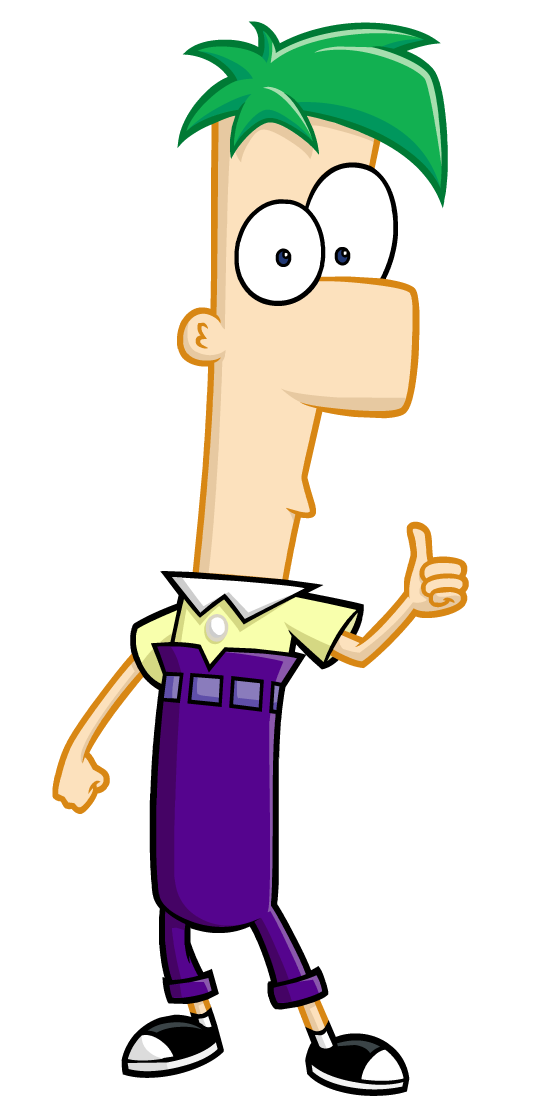
Ferb has, as seen above, green hair, mismatched eyes, a huge nose, prominent upper lip and a yellow dress shirt with high waisted purple pants. Yeah, he does look a little ridiculous if you look too hard, so try not to. The thing about Ferb, is that he changes his clothes a lot. No more than Phineas, admittedly, but somehow, Phineas always remains looking like a the boy he is. Ferb seems to pull off just about anything, even if Phineas looks even worse in whatever costume they've donned for the episode.
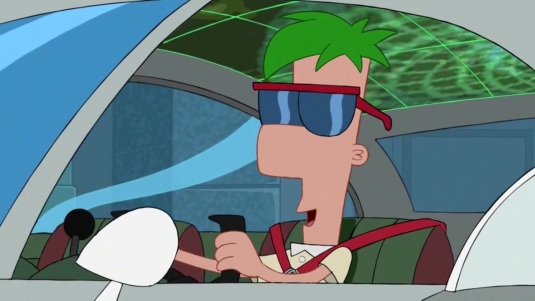



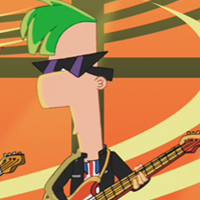

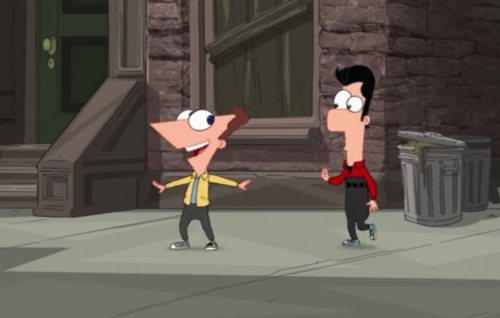
Let's just admit how fantastic he looks with black hair in that last pic, hm?
So Ferb is basically a good looking guy (as the TV show goes - I can hear you now 'If that's good looking, I don't want to see what the ugly ones look like'. And you don't. But don't you think he looks pretty good in that white tux?)
Now we've got the shallow part over with, on to bigger and better!

Just kidding. His eyebrows are killing me.
Aaaaaaand one more for my sake:

Ok, try not to jump down my throat on this one. Yes I'm writing a post on a character, which I've never done before. Yes I plan to do it more often. Yes I've chosen to do a children's character. Yes, he's cartoon. Yes, his name really is Ferb. No, I'm not sorry.
Though perhaps not what we mature "older people" would call 'deep', I've chosen to do Ferb because I'm lying sick in bed, bored because Netflix ran out of good movies and wishing I could watch P&F with Genna, because I feel like an idiot being 16 and watching it by myself.
I have also chosen to do Ferb because, out of the characters in this marvelously animated TV show, Ferb is the one with what I think can be called character depth. For a kids show, they all have a remarkable range of emotions, but I think that Ferb's lack of this exact quality speaks volumes, which is saying something because he usually says an average of 8-20 words per 22 minutes.
So how is this depth, you ask? Why should Ferb be the interesting one when Phineas is the one who does just about everything!!! Why ever prefer Ferb to Phineas? After all, Phineas is a good, all american boy who's got a great mind, creativity, a knack for building things, a big heart and a pretty good singing voice too. And Isabella likes him, that's a good sign, right?
While Phineas is very likable indeed, I seemed to gravitate towards Ferb ever since I saw my first episode. Maybe it was because he has a British accent. But it's time to evaluate. No need to stick with me since I'm not posting this anyway.
#1: Appearance:

Ferb has, as seen above, green hair, mismatched eyes, a huge nose, prominent upper lip and a yellow dress shirt with high waisted purple pants. Yeah, he does look a little ridiculous if you look too hard, so try not to. The thing about Ferb, is that he changes his clothes a lot. No more than Phineas, admittedly, but somehow, Phineas always remains looking like a the boy he is. Ferb seems to pull off just about anything, even if Phineas looks even worse in whatever costume they've donned for the episode.






Let's just admit how fantastic he looks with black hair in that last pic, hm?
So Ferb is basically a good looking guy (as the TV show goes - I can hear you now 'If that's good looking, I don't want to see what the ugly ones look like'. And you don't. But don't you think he looks pretty good in that white tux?)
Now we've got the shallow part over with, on to bigger and better!

Just kidding. His eyebrows are killing me.
Aaaaaaand one more for my sake:
And yeah. Just because.
Now for real, I promise! Let's have a look at his character now, by studying what he does in the series.
#2 Character
. As opposed to Phineas, who babbles on and on and on about basically anything you'll give him cause to talk about, Ferb doesn't speak unless he has something very important to say, and when he does it is usually either a deep insight into life or a trivia fact that shows off how wicked smart he is. Ferb, as described by Phineas in the very first episode, is "more of a man of action".
And it seems so, because while Phineas' creativity and leadership directs his stepbrother and the Fireside girls what to do, it becomes noticeable after not too many episodes that Ferb does all of the heavy lifting. You can say that Phineas helps, of course, because he does, but Ferb is always the one to man the machines, press the button, carry the supplies to be ready at a moments notice. He runs errands for Phineas and built the rollercoaster in the backyard almost singlehandedly while Phineas...you know, I don't even remember what Phineas was doing. But he wasn't exactly helping with the actual building. Ferb is handy with tools, it is clear, and is a master of construction. The reason that the show is called "Phineas and Ferb" and not just "Phineas" is because, as shaded to the background as Ferb may be, he is necessary to complete the tasks because he is just so good at what he does.
Ferb is not an emotional person by nature, probably because he's British. He rarely smiles or reveals any other facial expression, but when he does you know he really IS feeling it. One of the reasons I like Ferb is for that very reason: while the other characters are your average American show-your-feelings-to-the-world, Ferb much more closely resembles his pet Perry the Platypus, who tends to roll his eyes or cock an eyebrow as opposed to shouting or using words when angry. Ferb seems to have a very even temperament, because even when Phineas is angry, (Phineas has shouted at both Candace and Perry, Mission Marvel and Across the 2nd Dimension, and probably more but I can't remember) Ferb seems to regain control. He ignores Candace's plea to him rather than shouts at her (though this could be merely because he is focused on fixing a superhero suit), and actually tries to restrain Phineas' anger at Perry. Ferb feels he has the best of both worlds as a British-American (My Fair Goalie) and is happy with his life, even if he doesn't show it on his face. He never gets angry when Phineas' absentmindedness physically harms him on two occasions, either. The only time two times Ferb is shown to get irritated are when Phineas and Isabella give up the search for their lost lizard (which prompts Ferb's longest line, a shortened rendition of a Henry V speech) and in "The Beak" where Phineas and Isabella congratulate each other on their bravery and waltz off in the parade, leaving Ferb, who manned the legs of the suit and eventually the whole suit when Phineas goes AWOL to save Isabella, with an annoyed "Um, hello?! Entire lower half of an amazing superhero here!" No one hears him, however, and he shrugs it off with a "I guess there's no glory in thighs" and follows in the wake of the parade.
Ferb's maturity seems to outrank Phineas', which points to him probably being a little bit older (probably between 10 or 12). Indeed, while Phineas seems blissfully ignorant of Isabella's crush on him, Ferb knows and sees all and, though sometimes a bit ignorant himself when tagging along on what Isabella wanted to be a sort of date, is generally very kind to Isabella and good friends with her; walking away to leave the two alone, helps plan a nice evening for the two on Isabella's birthday, listens to her woe and lends her a hanky. Isabella, to my chagrin, rarely even says 'hi' to Ferb, and I am impressed by Ferb's continuing generosity to her when she ignores him for the most part. Ferb also gives advice to a grumpy Vanessa about love that mends her relationship with her father, and saves Candace several times. He lets Baljeet win a video game so that he won't feel bad, and generally supports helping anyone that needs him and his stepbrother.
Speaking of Vanessa, Ferb is definitely human since he has a crush on her and risks much to help her with little things. Vanessa, for reasons unbeknownst to me, likes some goody-two shoes instead. I hope that will change in later seasons, when their age gap isn't such a hurdle.
This goes to show that Ferb isn't perfect. He messes up the blueprints because he's mesmerized by Vanessa in the shop, he calls himself "weak" for liking her in the first place, and he has a taste for showing off a bit, perhaps because he doesn't talk much. Phineas also has this, though in a lesser quantity as he tells Candace that they build things for fun, while Ferb pipes in with a smexy "And for the ladies". Perhaps he does consider himself a bit of a ladies man, as he gives Isabella a wink when it is revealed that she will marry either him or Phineas (though he could just be teasing her, as no other evidence supports the theories that he likes her in any other way than friendship) and he backs up the spaceship he built to check out Vanessa with a "cool" look and a song in the background about her "digging his ride". So Ferb isn't perfect, but he's definitely charming.
#3 Skills.
Basically, Ferb can do anything. He's the champion at things like halfpipe and video games, and as I said before he can build anything. He can also sing in several keys, rap, and play at least 9 instruments, probably more. He is also a good dancer, as seen in "Nerdy Dancing". Ferb also speaks in several languages, including Japanese, Dolphin and Martian, and, as Phineas comments proudly in their day trip around the world: "No matter where we go, everybody knows Ferb!". He is pretty much exactly the kind of friend you would like to have.
Ferb rocks.
-Rhian
Ohh, did I mention that his voice actor is the only actor under 30 I'm attracted to?

Yup. He even looks like Ferb, in his own right.
Regan, Duchess of Cornwall
Personality:

Regan is the second daughter to King Lear and the wife of the Duke of Cornwall. Different from King Lear, who starts insane and gets slowly more in control of his mind as the play progresses, and Edgar, who only pretends to be mad, Regan is the only character who seems stable enough at the beginning while she appears to be gradually getting more and more twisted and bordering insanity as her passions and volitions take control of her.
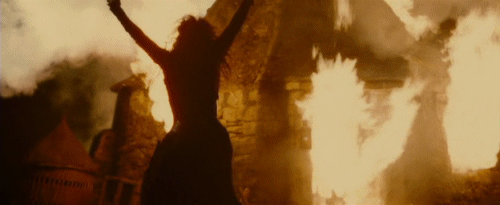
Regan suffers from what you might call and overkill of middle child syndrome. She never had the trust and respect of being the eldest daughter, nor the partiality and babying of being the youngest, and feels herself to be the underdog and as such the most deserving of everything and anything. She was always a bit rotten, and the resentment and frustration that has been building inside her for all the long years of watching her father go senile and she and her husband pushed to the back of all favors, turned inward and inflated her hatred, so that when the opportunity came to prove herself the "best daughter", it came out in passionate violence and revenge upon everyone who she believed had ever wronged her, including her father.

Regan is very impulsive. She gives her emotions free reign over herself and lets them drive her wherever they will. Whatever is happening in that moment, at that second, then all else is forgotten and she does whatever she feels without thinking of the consequences. She does not think ahead, plan or prepare, but instead acts before she thinks and lets herself go down paths without ever bothering to look back and see whether she took a wrong turn. She convinces herself that she doesn't care what anyone else thinks of her, though she has the emotional insecurity of a thirteen year old. Her temper is hot and the farther she gets into her sadistic vengeance the less she is able to control it.

Relationships:
King Lear: Regan hates her father. She believes he is a fool for underestimating her and what she believes she can do, and detests him for preferring Cordelia to her and Goneril. Though she thinks she has wanted his affection and trust all her life, when he comes to her for help and security, any love she once had for him is long gone, and she refuses to be saddled with him, insults him, tries to get her sister to take care of him and finally turns him out of her house, hoping he'll die in the wilderness, and prepares to invade his lands and claim them for herself. She relishes playing him like a puppet before casting him out, because she feels that this is how she has been treated.

Goneril: Though seemingly united in many goals with her sister, such as hatred of Cordelia and annoyance turned aggressiveness with their father, most of the play shows a competition between the two not only for the love of Edmund but also for the lands that were taken from the disowned Cordelia and a constant struggle to one-up the other. As the eldest daughter Goneril was depended upon and trusted more than Regan ever was, and the fact that, as little as their father gave them, Goneril still got more, makes Regan's animosity towards her sister only marginally less than most of the other characters. In the first scene the agree that they must do something about Lear's madness - all future scenes show a fake affection and quarrelsome looks that escalate into an obvious sibling rivalry that prompts Goneril to murder Regan.

Cordelia: Though only in two scenes together, one of which where they are both dead, it is clear that both Goneril and Regan dislike their sister because she is the favorite of their father and always gets the best of everything. While there is little doubt that the good Cordelia deserves this, it does nothing to assuage Regan's feelings of uselessness that she gleaned from the rest of her family. Cordelia's shame and banishment brings glee and vindictive pleasure to Regan, only heightened when her lands are taken and offered to her or Goneril. The war leveled between France and Cornwall/Albany proves that all three sisters have little love and much loathing towards each other that only ends when all of them are dead.

Edmund: The attraction of Edmund for Regan lies in the fact that at their core they have a very similar problem. Regan looks at Edmund and what she sees is not so much the handsome boy of the Duke of Gloucester - rather the fact that he, like her, is the child given little respect, he is the child of whom the father and siblings are ashamed, the child who is never given trust or love. He represents everything that she would like to do to Goneril and Lear, and is seduced by the idea that the bastard can do what she has been trying to do her entire life: rise above the given title of his family to make a name for himself and become the glory of the kingdom. Regan wants to be a part of that regime, the two underdogs getting their rightful place and crushing the undeserving beneath them.

Cornwall: If she ever loved him in the first place, since it was most likely an arranged marriage, Regan's love for her husband stretches only the the point where they both hate Lear, Goneril and Albany and they support each other's cruelty. There is a certain amount of affection between them - they have, after all, been married for many years, and they share a nasty side that comes to fruition in 3.7, but not enough to keep Regan from considering leaving Cornwall for Edmund, as Goneril does with her husband. Cornwall's timely death made it so that she did not have to make that decision, but it is in this scene that we see her softer side for the first and only time. Per her attribute of living in the moment, when Cornwall is wounded by a 'traitorous' servant, she is hesitant to help him but for a moment she forgets Edmund in lieu of a certain tenderness and instinct to care. It is short lived, however, like most of her passions, and when he is safely out of the way she continued to pursue Edmund.

Gloucester: One of the "good guys", Gloucester is rewarded for his loyalty to the king and Cordelia by having his eyes brutally removed by Cornwall at Goneril's suggestion and Regan's egging on. There is little conversation between Regan and the Duke besides insults and vehemence, and Regan sees him much as she sees her own father, thinking he has wronged her saintly Edmund in the same way that Lear has wronged her. He is detestable and dirt beneath her shoe, and is not afraid to inform him so when she gets the opportunity.
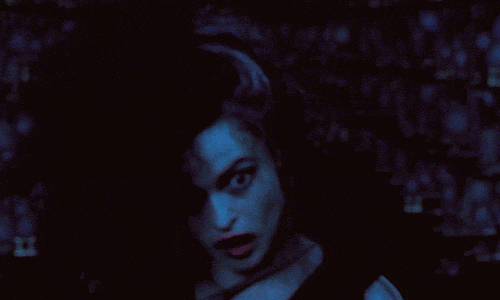
Kent: Kent is a supporter of King Lear and therefore must automatically be vermin. Regan begins to show her colder side when Kent is put in the stocks by her husband's will and his sentence prolonged from a few hours to through the day and night by Regan's. Kent is the main male beacon of good in the play alongside Cordelia, and he commits the unforgivable sin of standing up for her wronged sister to the point to treason, which to Regan is everything that must be hated and extinguished.
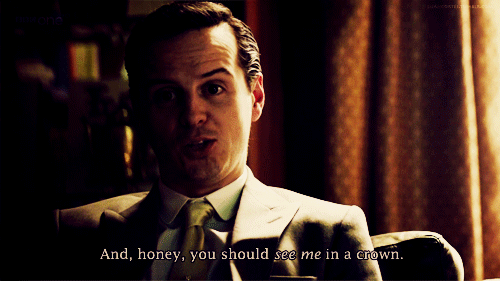
Oswald: As Goneril's servant, he is a source of information to be used, exploited and pumped dry until he is no longer needed and can then be thrown out with the trash. Regan finds him frustratingly disloyal to everyone except Goneril, who is the one person she needs him to betray, and ergo he constitutes someone very low in her esteem.

Edgar: Though they never speak to each other, Regan references Edgar once or twice, and holds him much as she holds Goneril: a usurper of the rightful and deserving ruler. Regan is the one who mentions that Edgar is Lear's godson, and this most likely does little to make her like him more; he is just another person Lear prefers to his own daughter.
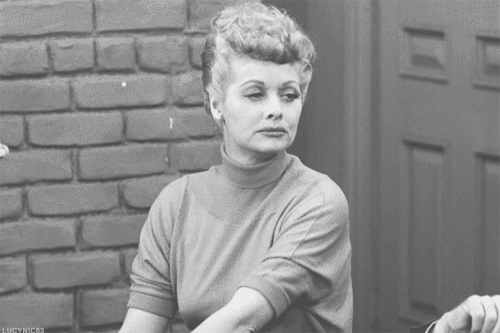
Albany: They rarely speak to each other, but when they do it is for Albany to rightly condemn and Regan to stand in horror as the poison Goneril has given her spreads. To Regan, Albany is a lesser version of her sister - less calculating, much less evil, but still greedy for the lands that Regan and Cornwall wants and the other half of the opposition that she hates. He is, however, a reason why Edmund should not have Goneril, and therefore useful to a certain extent, and he is formal to her, allowing her to be escorted away from the judgment the rest face imminently when she becomes sick, and shows respect for his dead sister in law by having her face covered even in light of her wretchedness.
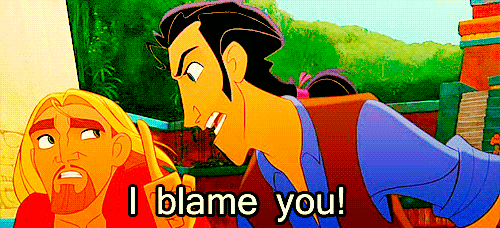
Fool: Though only onstage together once and never speaking to each other, one can only assume that, judging by Regan's character and Fool's behavior, that Regan sees him as a spouter of nonsense and lies that he father listens to more than he does her and a personal insult to the royal house and herself.
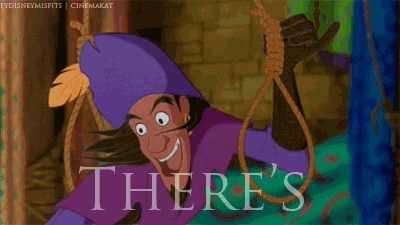
Regan is one of 9 dead characters at the end of the play, one of 5 who were murdered and not dead by suicide or heart failure, and one of 5 killed offstage. Thus she ends, without the Shakespearean habit of giving a dramatic speech.


Regan is the second daughter to King Lear and the wife of the Duke of Cornwall. Different from King Lear, who starts insane and gets slowly more in control of his mind as the play progresses, and Edgar, who only pretends to be mad, Regan is the only character who seems stable enough at the beginning while she appears to be gradually getting more and more twisted and bordering insanity as her passions and volitions take control of her.

Regan suffers from what you might call and overkill of middle child syndrome. She never had the trust and respect of being the eldest daughter, nor the partiality and babying of being the youngest, and feels herself to be the underdog and as such the most deserving of everything and anything. She was always a bit rotten, and the resentment and frustration that has been building inside her for all the long years of watching her father go senile and she and her husband pushed to the back of all favors, turned inward and inflated her hatred, so that when the opportunity came to prove herself the "best daughter", it came out in passionate violence and revenge upon everyone who she believed had ever wronged her, including her father.

Regan is very impulsive. She gives her emotions free reign over herself and lets them drive her wherever they will. Whatever is happening in that moment, at that second, then all else is forgotten and she does whatever she feels without thinking of the consequences. She does not think ahead, plan or prepare, but instead acts before she thinks and lets herself go down paths without ever bothering to look back and see whether she took a wrong turn. She convinces herself that she doesn't care what anyone else thinks of her, though she has the emotional insecurity of a thirteen year old. Her temper is hot and the farther she gets into her sadistic vengeance the less she is able to control it.

Relationships:
King Lear: Regan hates her father. She believes he is a fool for underestimating her and what she believes she can do, and detests him for preferring Cordelia to her and Goneril. Though she thinks she has wanted his affection and trust all her life, when he comes to her for help and security, any love she once had for him is long gone, and she refuses to be saddled with him, insults him, tries to get her sister to take care of him and finally turns him out of her house, hoping he'll die in the wilderness, and prepares to invade his lands and claim them for herself. She relishes playing him like a puppet before casting him out, because she feels that this is how she has been treated.

Goneril: Though seemingly united in many goals with her sister, such as hatred of Cordelia and annoyance turned aggressiveness with their father, most of the play shows a competition between the two not only for the love of Edmund but also for the lands that were taken from the disowned Cordelia and a constant struggle to one-up the other. As the eldest daughter Goneril was depended upon and trusted more than Regan ever was, and the fact that, as little as their father gave them, Goneril still got more, makes Regan's animosity towards her sister only marginally less than most of the other characters. In the first scene the agree that they must do something about Lear's madness - all future scenes show a fake affection and quarrelsome looks that escalate into an obvious sibling rivalry that prompts Goneril to murder Regan.

Cordelia: Though only in two scenes together, one of which where they are both dead, it is clear that both Goneril and Regan dislike their sister because she is the favorite of their father and always gets the best of everything. While there is little doubt that the good Cordelia deserves this, it does nothing to assuage Regan's feelings of uselessness that she gleaned from the rest of her family. Cordelia's shame and banishment brings glee and vindictive pleasure to Regan, only heightened when her lands are taken and offered to her or Goneril. The war leveled between France and Cornwall/Albany proves that all three sisters have little love and much loathing towards each other that only ends when all of them are dead.

Edmund: The attraction of Edmund for Regan lies in the fact that at their core they have a very similar problem. Regan looks at Edmund and what she sees is not so much the handsome boy of the Duke of Gloucester - rather the fact that he, like her, is the child given little respect, he is the child of whom the father and siblings are ashamed, the child who is never given trust or love. He represents everything that she would like to do to Goneril and Lear, and is seduced by the idea that the bastard can do what she has been trying to do her entire life: rise above the given title of his family to make a name for himself and become the glory of the kingdom. Regan wants to be a part of that regime, the two underdogs getting their rightful place and crushing the undeserving beneath them.

Cornwall: If she ever loved him in the first place, since it was most likely an arranged marriage, Regan's love for her husband stretches only the the point where they both hate Lear, Goneril and Albany and they support each other's cruelty. There is a certain amount of affection between them - they have, after all, been married for many years, and they share a nasty side that comes to fruition in 3.7, but not enough to keep Regan from considering leaving Cornwall for Edmund, as Goneril does with her husband. Cornwall's timely death made it so that she did not have to make that decision, but it is in this scene that we see her softer side for the first and only time. Per her attribute of living in the moment, when Cornwall is wounded by a 'traitorous' servant, she is hesitant to help him but for a moment she forgets Edmund in lieu of a certain tenderness and instinct to care. It is short lived, however, like most of her passions, and when he is safely out of the way she continued to pursue Edmund.

Gloucester: One of the "good guys", Gloucester is rewarded for his loyalty to the king and Cordelia by having his eyes brutally removed by Cornwall at Goneril's suggestion and Regan's egging on. There is little conversation between Regan and the Duke besides insults and vehemence, and Regan sees him much as she sees her own father, thinking he has wronged her saintly Edmund in the same way that Lear has wronged her. He is detestable and dirt beneath her shoe, and is not afraid to inform him so when she gets the opportunity.

Kent: Kent is a supporter of King Lear and therefore must automatically be vermin. Regan begins to show her colder side when Kent is put in the stocks by her husband's will and his sentence prolonged from a few hours to through the day and night by Regan's. Kent is the main male beacon of good in the play alongside Cordelia, and he commits the unforgivable sin of standing up for her wronged sister to the point to treason, which to Regan is everything that must be hated and extinguished.

Oswald: As Goneril's servant, he is a source of information to be used, exploited and pumped dry until he is no longer needed and can then be thrown out with the trash. Regan finds him frustratingly disloyal to everyone except Goneril, who is the one person she needs him to betray, and ergo he constitutes someone very low in her esteem.

Edgar: Though they never speak to each other, Regan references Edgar once or twice, and holds him much as she holds Goneril: a usurper of the rightful and deserving ruler. Regan is the one who mentions that Edgar is Lear's godson, and this most likely does little to make her like him more; he is just another person Lear prefers to his own daughter.

Albany: They rarely speak to each other, but when they do it is for Albany to rightly condemn and Regan to stand in horror as the poison Goneril has given her spreads. To Regan, Albany is a lesser version of her sister - less calculating, much less evil, but still greedy for the lands that Regan and Cornwall wants and the other half of the opposition that she hates. He is, however, a reason why Edmund should not have Goneril, and therefore useful to a certain extent, and he is formal to her, allowing her to be escorted away from the judgment the rest face imminently when she becomes sick, and shows respect for his dead sister in law by having her face covered even in light of her wretchedness.

Fool: Though only onstage together once and never speaking to each other, one can only assume that, judging by Regan's character and Fool's behavior, that Regan sees him as a spouter of nonsense and lies that he father listens to more than he does her and a personal insult to the royal house and herself.

Regan is one of 9 dead characters at the end of the play, one of 5 who were murdered and not dead by suicide or heart failure, and one of 5 killed offstage. Thus she ends, without the Shakespearean habit of giving a dramatic speech.

Saturday, September 27, 2014
On Why I Still Love M Night Shyamalan (and a special spot for Joaquin Phoenix).
THE FOLLOWING POST CONTAINS SPOILERS
Ok, I will come clean right now; this is a complete nerd post. I am a film freak and a passionate actress, and likely you will find that it comes out very clearly in my scribbles. Feel free to judge, just not too harshly.
Though I can't pinpoint the exact moment, I have wanted to be an actress from, lets say, around six or seven. Previous to this wish I was destined to be a fireman, but my older brother informed me that to do so I had to enter burning buildings. Suddenly, it wasn't all sliding down poles in your pajamas.
I had to change my sights, and set out to discover a new horizon. I won't bore you with the nitty gritty details.
I'll just skip right to the now sixteen year old me, struggling just to keep straight A's in my high school, going into senior year at a 365 days disadvantage to the rest of my class, with my friends going of the college and my staying home for a gap year looming on the horizon. For about a decade now it had been my firm dream and belief that films were meant for me. I've prayed about it, tried to let it go, gone the nine yards in discernment. I could still be wrong, and need some more time, but I will wait for God to open or close a door and in the meantime pursue my dream.
Anyway, that's not why I'm here. Maybe someday when I'm famous I'll write a book about my journey, but not today. Today I focus on the day that brought it all back into a stunning reality for me. Nine or ten years of dreaming doesn't get you real far when you don't do anything about it, and I have to be honest, as much as I wanted to act I had let the passion run stale. I was no longer confident in going forward with my decisions, and had basically let it all fade to a back - burner.
I am going to make something very clear, and this is significant: At the beginning of my dream career, as I planned my life, I swore that I would never act in a horror movie. I find the gore-fests and sex-glorifying 'horror' films of today that feed on everyone dying gruesomely and jump scares to pretty much be the tip of the trash heap in film. I myself get frightened very easily, so not only was I not to act in them, I decided against watching even classic horror like Psycho and Poltergeist. It just freaks me out. For a long time this kept me away from what would become my jumper cables back into my passion.
One night while hanging out in the basement my older brother hurt my feelings and, to make up for it, offered to watch The Village with me the next day. As his favorite of Shyamalan's films, and the fact that I was usually the one to drag him into watching something with me, I accepted; probably also because I realized that I couldn't call myself a movie lover without having seen The Sixth Sense, and I wanted to ease myself into that horror story with a slightly less frightening film of this director named Emnite Shy-something.
So there I was, the next day, wrapped up in a huge blanket and nibbling on pretzels, ready to dive under the table or scream into my blanket if necessary. Oh, I had heard horrors about the Village. Scary, I heard. Terrifying, I heard. Filled with suspense, I heard.
It sucks, I heard.
I grit my teeth and prepared myself.
I watched, and I never let my eyes drift away from the screen. I was riveted; but not because I was scared.
I have a section to discuss The Village later. For right now I'll skip the movie and tell you what happened next. I went out and rented Signs and watched it, and after that popped in the Sixth Sense. M Night - and Joaquin Phoenix, who I shall also give a few paragraphs to - had kick-started my passion again. I wanted to fly. I wanted to buy a ticket to California, walk into Hollywood and announce that hello, I was going to be working here for a few decades and could you tell me where Mr. Shyamalan was? I'd like to give him a really big hug. And call Mr. Phoenix in too, if you don't mind, because I need to inform him that he just changed my life.
I am going to give you a bit on M Night before I give you my take on what I find to be his five greatest successes (in order of release): The Sixth Sense, Unbreakable, Signs, The Village, and Lady in the Water. M Night was 22 when he made his directorial debut with a film that, frankly, nobody saw: Praying with Anger. He was 28 when he made his next film, Wide Awake, that got more notice because of names like Rosie O'Donnell and Dennis Leary, but most people either didn't know it was him or didn't even know it existed.
These two original movies of his were understandably swept over when, only two years later, the thirty year old M Night created his most famous masterpiece, The Sixth Sense, which got not only a lot of attention from fans and critics alike but also skyrocketed M Night to the pinnacle of movie making and earned 6 Oscar nominations to boot, including Best Picture.
Suddenly, Mr. Shyamalan wasn't some no name from India. He was famous, he was admired, he was hailed as the next Steven Spielberg. Unfortunately, this film also proved to be what a lot of people consider to be the paving of the way for his downfall. More on that later.
So why do I love this guy so much? Yeah, he made some good movies. So what?
I'll admit it, I came late to the game. Later than I ever would have come if I had known what he could do. So I missed all the hype when his latest movies came out. By the time I had bothered to see his movies, the most I knew about him was that most people's opinion came down to something along the lines of: "I can't believe the guy who did Sixth Sense directed THIS (use The Happening, Avatar, Lady in the Water or After Earth interchangeably).
But me? All I knew was that I had seen something I had never seen before. I think, for me, that's what his films really came down to. I had seen something in The Village, and in the subsequent films I watched, that I had never seen in any other movie. I can't even put my finger on it; it was a blend of well cast, well scripted, and I think above all the underlying themes and beautiful artistry that wove it all together.
It was, to put bluntly, a breath of fresh air. I look at the box office today, and I see four types of films; oober romantic, whether disgusting comedy like Sex Tape or dramatic coming of age cliche like The Fault in Our Stars; Bloody horror like I described above; Superhero/ Action movies where people I know have fallen asleep to things constantly blowing up and woken up forty five minutes later to things STILL blowing up; and War and Slavery films trying to raise awareness of things in the past without really giving us a lot of solid historical fact at all. Not that all of these movies are bad: some of them are good, and obviously there are many exceptions to these four mainstream genres.
But I don't think I have seen a truly great movie in theaters in a while.
M Night changed everything. He was different, and I think these are the three biggest reasons why (note: these pertain to the five films I mentioned earlier, not his later ones):
#1 Taking the time to think.
Wait, you mean we went an entire movie without something blowing up? Two movies? Three movies? Gosh, how did we survive? There is a stimulating mentality that has gotten into our films these days with viciously high definition pictures to the point where everything looks fake and hurts your eyes, extreme closeups where you can count every pore on someone's face, something blowing up every few seconds, and worst of all the constant need for scenes to cut to the next one lickety - split, one liner dialogues and an inability to have two characters share a realistic conversation because people will supposedly get bored by how slowly it is moving.
One of M Night's signature aspects in his films is the fact that he takes a longer time with scenes; conversations are often held at a distance away where you cannot clearly see the subject's face, dialogue is drawn out so that the characters have a chance to show that yes, they can actually speak to each other normally, and finally his camera angles and shots that are artistic and creative, contemplative and leaving you a moment to take in the previous scene and realize what you actually witnessed.
#2 Not Horror
Probably the most common misconception of M Night's films is that people think they are horror. One of the reasons many people disliked The Village and even more so some of his other films were complaints about them "not being scary enough". Let's get something on the table right now: Shyamalan's films are very clearly rated as thrillers. To be exact, psychological thrillers. Yes, the trailers can easily give the horror illusion, and yes, The Sixth Sense has some pretty big jump scenes and the entire concept was pretty horrifying. But I watched these movies, and I barely saw the jump scares.
I saw that the true horror lay, not in the claws of Those We Do Not Speak Of, not in the bloody hole in the back of the teenager's head or the alien onscreen, but rather in the undertones of the film. Not what you saw, but what you didn't see. What was only implied, or the realistic, fearful situation. In his films I didn't just watch ghosts scare a kid or a town living in constant fear from monsters. I wasn't turned off by constant violent deaths, possessed people whose families are too stupid to get a priest to help or a festival of cheap porn. It was, in short, the thrill of watching people experience life changing events based on past failures and weaknesses. I watched the consequences of actions unfold into a believable, fearful way of life. The mind horror behind the movies just exploded onscreen more than any burning building Superman could throw at General Zod.
I lay awake at night after watching these movies, not because I feared something would grab me out of the dark, but rather because I was thinking, constantly thinking about the movies...they are psychological thriller masterpieces.
#3 Artistic Threads and Patience
Lets just face it, his films are filled with creativity and artistry that the rest of we mere mortals can only dream of. How many people actually figured out the significance of red in the Sixth Sense without someone telling us, or that M Night strictly forbid that color in any scene that wasn't a cross-over between the spirit world and ours? The original name of The Village was Grey; was this Lucius' never-told color, the balance between the innocent goodness of yellow and the bloody, harsh truth of red? Did you know that Bruce Willis is left-handed and he taught himself the write right-handed in the Sixth Sense because M Night didn't want anyone to notice that he didn't have his wedding ring? You can tell, I am told, because he circles things in a clock-wise fashion, the way left-handed people do. I mean, who even thinks of those things?
More importantly, do they matter that much?
No. And that's the beauty. They're in the films, you can see them if you want, but they aren't crucial. They're just added bits of pleasure and fun that he patiently took the time to work with his cast and crew members so that we, the audience, could enjoy some radical films, without disturbing the main plot line of the movie. They are the difference between a good film and a great film. He is a brilliant man, M Night. And it shows.
I could mention many more elements of his films: They tend to be on a small scale, personal level (in Signs they alien invasion was not shot from a worldwide view, but rather focused on a single farm and a single family). He usually writes, directs and produces his films. There are often religious elements in his films, and religious symbolism. He tends to reuse actors/actresses in his movies, and also cameos Alfred Hitchcock style in many of his films.
Surprised I didn't mention twists in the big three?
As I stated earlier, I think that while many hail Sixth Sense as his greatest achievement, it was also very difficult for him to live up to everyone's expectations after that. Everyone expected a massive twist that no one would see coming at the end of all of his movies. People raged at Signs and The Village because they were 'predictable twists'. No offense to anyone, but just because he did it once doesn't mean he has to do it every time. There are small twists, sure, but like people complained, predictable. Some films, like Lady in the Water, didn't really have twists at all. Its unfair to base all of his films on one (albeit a great one). When people starting getting expectant, they became dissatisfied. I'm sure we've all had the frustrating experience of having a movie hyped up for us or being excited by a trailer and have our expectations put at unrealistic levels, and coming out of the theater disappointed. In M Night's case, we have no one to blame but ourselves. Perhaps many his films after Sixth Sense aren't as high caliber, but it doesn't make them bad films. In fact for many I think Signs and Unbreakable are first choice. I know a few people, myself included, whose favorite is The Village. While I've yet to meet someone whose top pick is Lady in the Water, it does not mean that it was a terrible movie. Actually, it was a wonderful movie.
I will now review my personal opinion of the films, not in order of their release but rather in the order that I viewed them. Its easier for me to keep track that way.
The Village, 2004, Starring Joaquin Phoenix and Bryce Dallas Howard
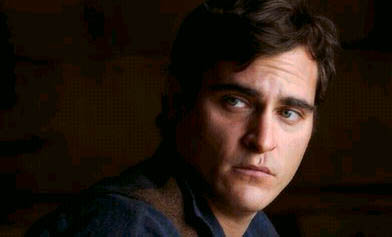

WHY IT IS GOOD: Perfectly cast, with maybe the exception of Judy Greer, whose voice doesn't quite sound right with the rest of the cast, The Village is exciting but also so full of the artistic beauty that of all his films, this is the one, set in the innocence of nature, that gives time in the film itself for contemplation. Joaquin Phoenix pulls off a spotless performance as Lucius Hunt, the shy and withdrawn boy of the village on the outskirts of Covington Woods. Bryce Dallas Howard, who most people recognize from Lady in the Water and her later roll as Hilly Holbrook in The Help, does an incredible job. I was blown away in scene after scene that she was in, specifically with her ability to portray fear and grief without going overboard and hyperventilating like I see too many actresses do these days. I'm surprised she hasn't won an Oscar for something yet. The supporting cast of William Hurt, Adrian Brody and Sigourney Weaver pull it all together for a film that draws you into the lives of these characters.
Not a day goes by that I don't think of this movie. The entire film has a bleak undertone and while there are suspenseful moments, I think most people got bored when they found out that there were no monsters. Not me. For me, the monsters were very real indeed. The monsters were the people who had brutally killed the Elders' loved ones, and they were the lives of pain that they had locked up inside themselves. The monsters were even more so the Elders themselves, ruling their children by a terrible, constant fear in an effort to keep them from pain that they simply cannot escape, because as Mr. Walker points out, "Heartache is a part of life. We know that now." Nevertheless, their final decision at the end of the movie to continue the illusion of frightening beasts to hide the real illusion of the modern-day town represents the fact that they let themselves be controlled by a constant fear and place the same burden on their children, which is monstrous. Still, you feel a wretched pity for these most likely psychologically unbalanced people who had everything they loved ripped from them and therefore did cruel things to their offspring in the hopes that they were being kind and preserving the innocence. You cannot say that their heart wasn't in the right place.
It is too easy to acquit or condemn their choices, but I don't think it is meant to be black and white. Real life rarely is, after all, and the whole movie is very grey-tinged, because the choices all fall into the grey area of morality. It is not a depressing movie, but one certainly cannot classify it as cheerful or even happy. As I said before, it a stark, bleak film shot with very little bright color and where the fear that the people live in is tangible. Some people I know complained that they couldn't 'relate' to the characters so it wasn't as scary. I didn't have to relate. I could taste their terror just from something as simple as a camera angle and the lighting. I felt every emotion that crossed Ivy Walker's face; looking back on some of Lucius' lines still gives me butterflies, remembering how I could feel what he did in the pit of my stomach as he said it.
Topped off with a hauntingly beautiful soundtrack that nabbed an Oscar nomination and holds a very honored place on my Spotify list, a clever cameo by the director himself and just enough jump scares to keep you hopping, The Village is one of M Night's best masterpieces.
WHY PEOPLE DON'T LIKE IT: The Village was the film that set most people against M Night with what they called a "predictable ending". I suppose it was predictable: I had no idea when I saw it, but the three friends I later watched it with all figured it out. It's likely that I'm just stupid that way, but to be honest I wasn't trying to figure it out. To be fair, I wasn't expecting a twist in the least like many others, so I wasn't looking for one. But I discussed the unfair assumptions in a previous section. The truth is that The Village simply has a different feel to it than the Sixth Sense, and it is much more of a psychological thriller than any of the others, and people didn't expect that.
Other complaints:
It "wasn't scary enough" So-and-so walked into it expecting to be scared and thought there weren't enough frightening scenes. Like I said, this guy isn't a horror movie director. There were scenes worthy of this title in Sixth Sense, surely, and that trained people's brains to assume. But even that film isn't classified in the horror genre, and much less so is The Village. The audience's erroneous conclusions are no one's fault but their own, and their frustration is taken out on the film itself. TO BE FAIR the trailer made it look like a movie where everyone would be viciously slaughtered by huge evil monsters. This was bad marketing, but it doesn't necessarily detract from the movie itself.
Why send Ivy? Why doesn't one of the elders go? It's so stupid that they'd send the blind girl alone into the woods to get medicine! They've got to be insane or something. Remember that the Elders swore an oath that they would never go back to the towns. These people took oaths very, very seriously. Obviously if they weren't serious about it they wouldn't have packed up and gone in the first place. As for them being insane, I actually think that most of them probably are a little bit mentally deranged because of what happened to them. They met at a counseling center, remember. I'm not saying it would happen to everyone if someone they loved died - it doesn't happen to most people - but M Night chose to make a film about these specific dozen Elders who went a bit crazy with grief and wanted to go create a Utopian society of innocence.
And why send Ivy? In the selfish and pained minds of the Elders, Ivy alone could go and get the medicine because, remember, the real illusion they tried to create was not so much that there were monsters but rather that there was no modern world. Ivy, who was blind, would not grasp this reality in the same way that a person who could see would. For them, Ivy could get medicine without bringing an end to the innocence of their village.
As for going alone, they didn't send her alone. They sent two boys with her that she would leave once she got to the road to town so she could go alone to get medicine and then return with them, remember? It was a complication that they hadn't foreseen, however, that the fear they had created ran so deep that the boys ran in terror. Ran in terror as Ivy would have done had she not been driven by love for Lucius. Isn't that what all the decisions in this movie are driven by? Love, loss of love, love rejection and fear of losing love. The Village is, as I heard someone put it, first a foremost a love story.
Ivy, as Mr Walker says, is 'more capable' than many people in the Village. While he doesn't expound it is clear that Ivy isn't helpless. Her lack of sight would be guided by the two escorts, and her strength would take her down the road to get medicine.
Signs, 2002, starring Mel Gibson and Joaquin Phoenix
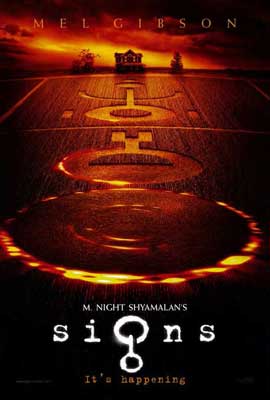


WHY IT IS GOOD: This is a fan favorite over The Village and sometimes even Unbreakable. Also very well cast; though Rory Culkin wasn't on top of his game the whole time, Abigail Breslin could have nabbed a Golden Globe nomination or something for her performance as Bo Hess. Mel Gibson did well though I think he was outshone by Joaquin Phoenix in this film. It definitely had more humor than Shyamalan's other films, and had a more definite plot line and means to get to an end. Also, it focused on the element of family and recovering a lost faith after the death of a loved one, an experience so many people have gone through. It also brought everyone's favorite subject - aliens - into a frightening realistic situation of an attack in your own home and worst-case scenario like being trapped in a basement with an asthma attack and no way to get your medicine. It explored faith and emotion and fear, and most people say it is far scarier than The Village. There is subtlety; one of my favorite scenes is in the basement when Morgan is having his asthma attack and as Merrill and Bo watch helplessly, the camera zooms ever so slightly onto Merrill's face in particular. It stays there and while he tears up he is moving his lips just barely enough and long enough that you can tell he is praying. It is so small a thing, but it just adds to the richness. Signs is the kind of movie that you can watch a lot and not get tired of, and also never understand everything. I have heard many different theories, such as that the aliens were there to help, the alien that almost killed Morgan was really Colleen or that it was all a dream, and there is enough sufficient evidence to support them that you can view it over and over, and never the same way twice.
WHY PEOPLE DON'T LIKE IT: Despite it good merits, people had problems, again, with the lack of fear in this film. It is much more surface-level (i.e. jump scares) than the way The Village simply reeks of a hidden oppression, and while Shyamalan does a good job of not clearly seeing the aliens, I think people would have preferred a bit more attack and less invasion. Small wonder everyone's favorite scene is Merrill beating the crap out of an alien with a baseball bat - for most people, it was about time! The script is also more disjointed than his other movies, such as Graham giving a nice speech to comfort Merrill, who then asks what Graham believes, and Graham, responds with a conversation-closing "Are you comforted?" When Merrill responds positively he says "Then why does it matter?". It would have been a good place to end, except that Graham decided he would crush Merrill's comfort and faith by telling him his wife's last words. Bit of a downer, eh? We were all glad when Merrill stood up to his brother in the basement.
Other main complaints include:
Why did he have to bring his faith into it? It would have been a better movie without it. Listen, I don't care if you're atheist or whatever, and I'm pretty sure M Night doesn't either. Anyone who is serious about their faith can find a spot for it in their film, and it was beautifully done. Sorry if you don't have a faith, but that's not his problem.
It's so dumb that the water defeated the aliens! Wouldn't they check that the planet they were attacking was mostly made up of water? What a stupid plot twist! First of all, let's remind you all that it is not a plot twist; M Night's character mentions it halfway through the film that they don't like water, and that the reason they made the crop circle maps are because they wanted to be away from the lakes and oceans, in a dry spot. Obviously they knew the planet was mostly water, that's why they made their landmarks where they did. What the aliens didn't know was the the we knew they didn't like it, and no one should have been surprised when Bo's neglected glasses killed off the last invader. If that "twist" shocked you, you obviously weren't paying attention.
Myself, I found Signs much less frightening then The Village. Aliens are not as realistic and overall I didn't find the jump scares as compelling. I also found many things very predictable, from what line would come next in a character's sentence to Merrill having an epic scene with a baseball bat to an alien appearing in the living room (seriously, when someone says "I'm going to get the TV" no camera follows the guy out of the room, into the closet, down the hall with the TV and back out unless there's going to be something that wasn't there when he left). I also always wondered why Merrill missed the large extraterrestrial when he scanned the house before bringing the rest of the family up, but these are minor problems that are easily overlooked and don 't detract too much from the film.
Before I start on Sixth Sense, I'm going to dedicate a section of this to Joaquin Phoenix. As I said before, M Night wasn't the only one who encouraged me to look more seriously into acting.
Previously I had only seen Mr. Phoenix in Gladiator and, though I didn't realize it, Brother Bear. In Gladiator I was impressed by his ability but disgusted by his character and was focused on analyzing Russell Crowe's performance above all else. When I sat down to watch the Village, I was pleased because "that guy who was really good in Gladiator would be in it". What I hadn't bargained for was being phenomenally in awe of his portrayal of Lucius Hunt. The character was beautiful and every time one of the girls in the movie proclaimed their love for him I concurred wholeheartedly.
When I watched Signs I was thrilled to see him play an every bit as attractive character but with a completely opposite temperament to the silent Lucius. He was realistic and believable and seeing him in these films caused me to do some more research on this guy who previously I had only known as the bad guy in my brother's favorite movie.
While I discovered that he was a vegan and an atheist, two things I will simply never understand, I also found out that he was pretty much everything I had always respected about Hollywood actors. He was never typecast and played a vast variety of roles, something I had always wanted to do. Even from the three movies I had seen him in, I was aware that this man could pretty much do anything. I liked that he wasn't conventionally handsome; he didn't have a perfect body, and even less so a perfect face, so while the rest of my friends ogled at Chris Pine, I pondered how cool it was that the dark circles under his eyes and his scar didn't detract from a performance, but rather enhanced the facial expressions and, quite frankly, made it all the more attractive to me. I remember telling one friend what an incredible actor he was, and she said bluntly "That guy? I think he's ugly." I tried very hard not to laugh in her face and instead calmly recommended that she watch something with him in it before she made a call like that. Just about the most good I ever managed to get from a friend about him was "he was great comic relief in Signs" and "I like his hair in The Village."
But more importantly, I saw that he took every film seriously. When he wanted to do a character, he didn't just put on the costume and do what the director told him to do. He went the whole nine yards and changed himself, putting everything into his roles: Changing his voice tone for Walk the Line instead of simply moving the songs up a few notes, as they had been planning to do, putting on weight and getting white for Gladiator (something I in particular can appreciate, being an Irish marshmallow surrounded by people getting tans; people telling me "hey, to be white was the height of fashion 2000 years ago" isn't exactly comforting). I heard that he ad libbed his scream of "Am I not merciful?!", which I think is the only time in the whole movie he really raises his voice, and got so emotionally involved in the scene where he kills Marcus Aurelius that he fainted afterwards. That is dedication, right there. His talent and resolve is everything I have always wanted to be in an actor. There are only a couple of other actors with that kind of resignation to ruining physical attributes: people like Tom Hanks, Brad Pitt, most notably Christian Bale who is likely to suffer from The Machinist all his life.
Of course my family laughs at me and thinks I'm insane, assuming I'm just going through another of my phases. They say things like "You can't be in love with 40 year -old men that you don't even know!" (although I think he's only 39). What I've pretty much given up explaining to them is the fact that I'm not in love with Joaquin Phoenix. I am in love with the idea of his talent, and I am admittedly attracted to his characters of Lucius and Merrill. But it is because of what he brings to them rather than he himself. As I told my sister, who is in college, "Sarah, you're majoring in Math, because its what you want to do, right? I watch movies, I find out everything I can about people like Joaquin Phoenix because this is something I want to spend the rest of my life doing. What he does, that's what I want to be able to portray. That's what I want to be able to give people." I'm not sure if I got the point across, but it quieted her down for a few hours, until I happened to mention his name again. They say he's done bad movies; I'm not the kind of person who, if I like an actor, wants to watch every movie they've ever done. I know he's done films I don't agree with; there are precious few actors who haven't. But it doesn't mean I don't idolize what I do like that he's done, and it doesn't mean I'm going to despise him. After all, look what he's given me!
Wrapping up, I re-watched Gladiator and saw that, once again Mr. Phoenix had created something incredible to match Russell Crowe's fantastic Maximus. I found myself almost crying with a sort of sickened pity for Commodus, because Joaquin brought that to the forefront and forced me to see it even when I just wanted to condemn him. No one likes a villain who is just vile and has no motive. Its why we are drawn to Loki, Bane, The Joker; people who have lived pathetic lives by no fault of their own and came out hating the world and fearing it as well. Yes, Commodus is twisted, sadistic, wrong on a number of levels and violent and cruel. But instead of automatically damning him, I watched for motives, and I found all too many of them. I'd go father but this isn't a character study of the emperor so I will close with this: Joaquin Phoenix skyrocketed to number two on my list of favorite actors. Everything he did in these films strengthened my resolve to, God willing, make it in Hollywood. I love to become characters, all kinds of characters, to explore them and make them a part of myself, and his performances reminded me of this love. If I ever meet him, as I hope and pray I will, I want to thank him for what he has given me.
The Sixth Sense, 1999, starring Bruce Willis and Haley Joel Osment.

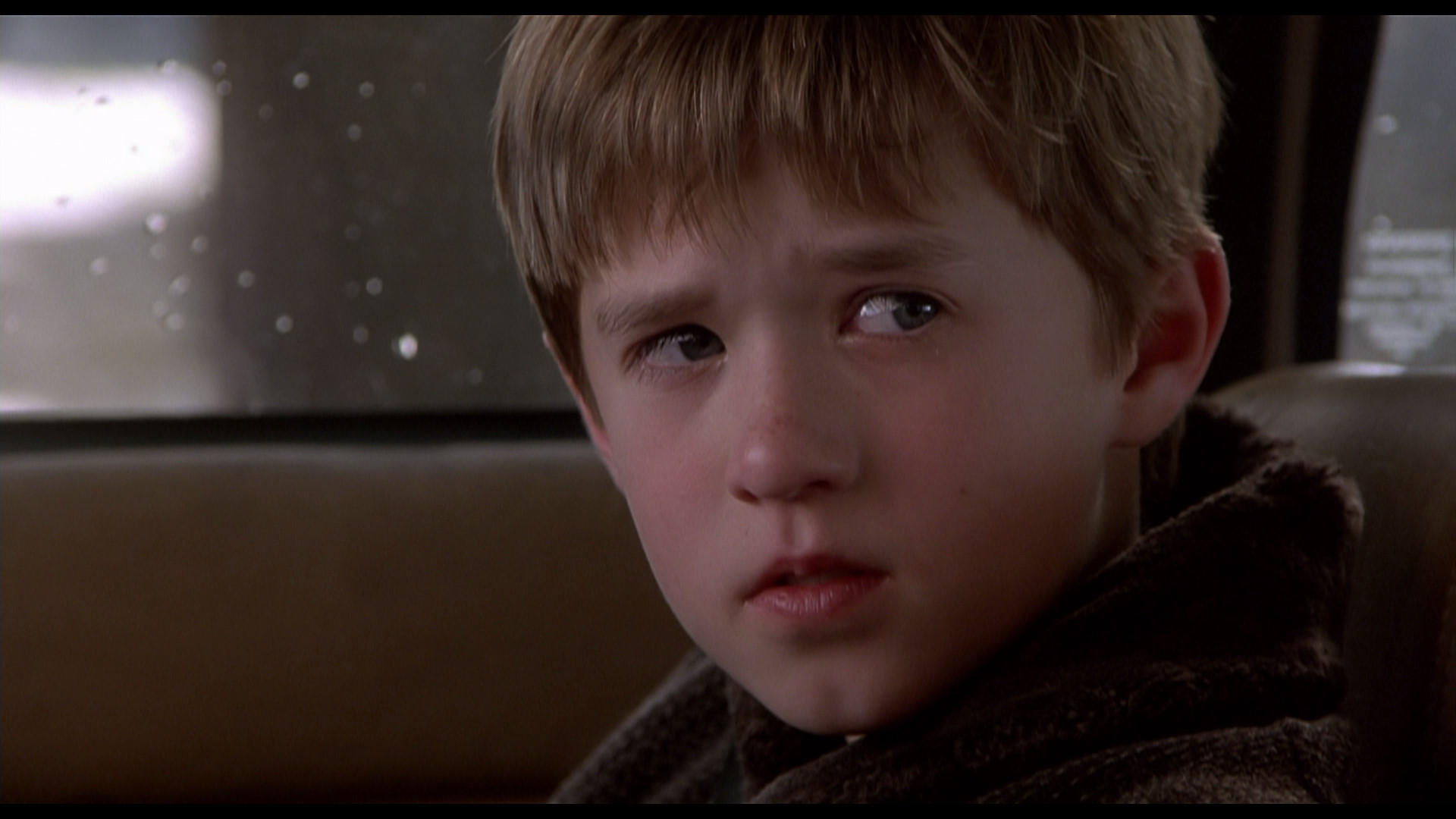

WHY IT IS GOOD: It is universally acknowledged that the Sixth Sense is M Night's greatest achievement. You'd think no one had ever heard of a twist ending, the way they rave about this film. Indeed, the surprise plot twist has pretty much become a cultural reference; or it would have, if anyone spoke of it. If God had issued an eleventh commandment, I think this would be it:
XI: THOUGH SHALT NOT TELL THY NEIGHBOR THE END OF THE SIXTH SENSE
I myself had the ending spoiled for me (don't watch ScreenJunkies "Worst M Night Shyamalan movie because they gave it away. I almost sued them I was so mad), but it didn't mean that it wasn't a fantastic watch. Wonderfully cast, especially in the case of young Haley Joel Osment (where did he FIND this kid? he is AMAZING), who grabbed an Oscar nomination for his portrayal of the frightened young boy who can see dead people, The Sixth Sense is a story that could easily mislead people into thinking M Night's specialty is horror. Gruesome and frightening ghosts fill its scenes, but there is constantly a deeper message of communication and love. One of the actresses claims that she was so moved by the emotion in the film she didn't even realize it was supposed to be a horror movie (which, as we know, it wasn't).
Besides being masterfully filmed and well scripted, The Sixth Sense really showcases M Night's patience and artistic genius: the use of the color red in nail polish, ink, doorknobs, clothes and other ordinary everyday articles painstakingly used in all the scenes that show a crossover between the spirit world and ours and forcefully omitted in all others. It was also filmed in sequence, rare in many films. As I mentioned before, Bruce Willis learned to write right handed so that sharp-eyed viewers would not notice his lack of a wedding ring. The film's famous line "I see dead people" has gone down in history alongside "Say hello to my little friend" and "Here's looking at you, kid".
WHY PEOPLE DON'T LIKE IT: There are only a couple of really nit-picky people who can claim that they didn't like the Sixth Sense, my mother included. Some people just didn't like the fear, which is understandable. As far as bad technicality goes, the main complaints seem to be:
Wouldn't Malcolm notice that his wife literally never talks to him? People's marriages don't fall apart in a matter of days to the point where they never speak. Doesn't he notice that NOBODY ever sees him or speaks to him? How did he get his information on Cole if no one could give it to him or buy anything from a store? Its ridiculous! Basically, the answer to this question is the fact that everything we see, we see from Malcolm's point of view. He doesn't realize that he is dead, and lives in a sort of dream world where he has no reason to assume he is invisible to everyone else, and often perceives things in a way that they aren't (like the table in front of the basement door; he is still able to get into his study without a key but obviously can't physically get in so he must appear there and not realize that he just appeared without going through the door). In dreams, we often go from place to place and don't realize that we never actually got there by walking or driving or any other method of transportation. Everything Malcolm sees, like his information on Cole and buying a new coat or something, he sees because its what he needs to see, wants to see and expects to see. Time doesn't go the same way for Malcolm as it does for us; and often he believes his wife does talk to him, as cleverly shown in the restaurant scene.
Wouldn't Cole notice that Malcolm was dead if he can see dead people? Wouldn't he see the bloody bullets wound like he does on everyone else? The answer is that Cole DOES realize Malcolm is dead. It is why he runs from him and hides in a church when he first sees him, and it is probably why he never mentions "that psychiatrist you're making me see" to his mother, since he knows his mother can't see him. Remember, the reason we never see the bloody wound is because we are seeing Malcolm as he sees himself, and that is alive and well. Cole, however, I'm sure realizes that Malcolm is very much dead, but doesn't want to tell Malcolm, perhaps because Malcolm is unlike many of the other ghosts and instead of harming him is helping him. This is why he seems confident when he tells Malcolm he won't see him again tomorrow, because he knows that once a ghost's purpose is fulfilled then it disappears. He realizes that Malcolm's problem was guilt over Vincent, and once he has redeemed himself by helping Cole, the game will be up and Malcolm won't be coming to see him anymore.
Unbreakable, 2000, starring Bruce Willis and Samuel L Jackson
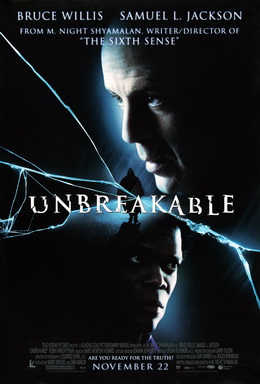
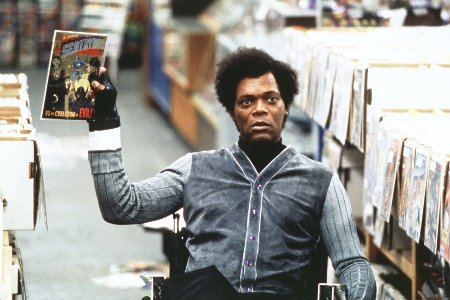

WHY IT IS GOOD: Unbreakable is M Night's personal favorite that he has done, and I think many people would agree. It is a gritty story of comic book heroism in the real world, a tale of something we all wish existed - superheroes - told in a realistic fashion that doesn't involve demigods, aliens or Iron Man; instead it is a man with a rare gift struggling to understand it, and the pitiable Mr. Glass helping him to find his place in the world. Critically acclaimed as one of Samuel L Jackson's best performances, Unbreakable is well acted and well-paced; not scary like many of his other films, but suspenseful, dramatic, marketed to superhero lovers and drama people alike, and most of all, sad. Not in the tone of The Village, that simply has that undertone that seeps into your skin, but very forcefully shoved in your face, specifically in the last minute and a half. Many people like that it took superheroes "seriously".
This was also a rich display of the hidden perks M Night likes to put in for observant audiences; when David meets Elijah and is told about his theory, they are wearing red and purple shirts (respectively), representing opposite ends of the color spectrum. Many of Mr. Glass's scenes involve glass - his walking stick, TV screens, mirrors, etc. Bruce Willis' David Dunn is an alliteration, like Bruce Banner, Peter Parker, Clark Kent, and so on. Elijah's first comic book is said to have a "surprise ending", just like the film. These are only a few of the subtle touches Shyamalan puts into this film.
For me, Unbreakable had an oddly different feel from his other films. It is without the whimsical bleakness of The Village, the fright and horror of The Sixth Sense, the fairy-tale land of Lady in the Water and the unrealism of aliens in Signs. Combining one of history's favorite past times of comic books heroes with the very real world of crime made for an intriguing film that made me understand why my friends said, when they heard I had seen The Village "Ok, you gotta watch Unbreakable next!"
WHY PEOPLE DON'T LIKE IT: You've got your person who doesn't appreciate a movie that's not choc-full of explosions and bloody bodies and fist fights. There is enough action in this film to tide your average audience over, but it was definitely more of a drama and emotional look into the lives of two unbreakable and at the same time broken men, one mentally unbeatable but physically frail, and vice versa. I accept people who just don't like the genres this film fits into, but anyone who tried to argue against technicality and execution just aren't thinking about it hard enough.
The main complaints are:
It was so boring! I thought this was supposed to be a superhero movie. Way overrated. I'm sorry if you can't appreciate a film that delves into the emotions of a real-life superhero and his nemesis. Go watch Man of Steel if you want cheap character flaws and a lot of unnecessary violence.
So predictable! I saw it coming from a mile away! And the ending sentences are stupid. The ending just SUCKED. Ok, so you saw it coming. I did too, and that's saying something big. But there is a difference between guessing the twist in a film and the film itself being 'predictable'. Predictable is when you can guess the next scene, the next line, how all the characters will end up, what will happen next. Unbreakable has none of these things.
As for the ending sentences, that really struck home for me. It made it seem like it was based off of a true story, that it was real life, because Mr. Glass is one of the most pitiable and real 'comic book' villains I have ever experienced. It fit the vein of the film, and tied it up nicely. It was realistic. I mean, would you rather it be a legit hero movie where David flew off into the sunset with his girl, and Mr. Glass screamed revenge? If you would, you missed the entire point of the movie.
Lady In the Water, 2006, Starring Paul Giamatti and Bryce Dallas Howard

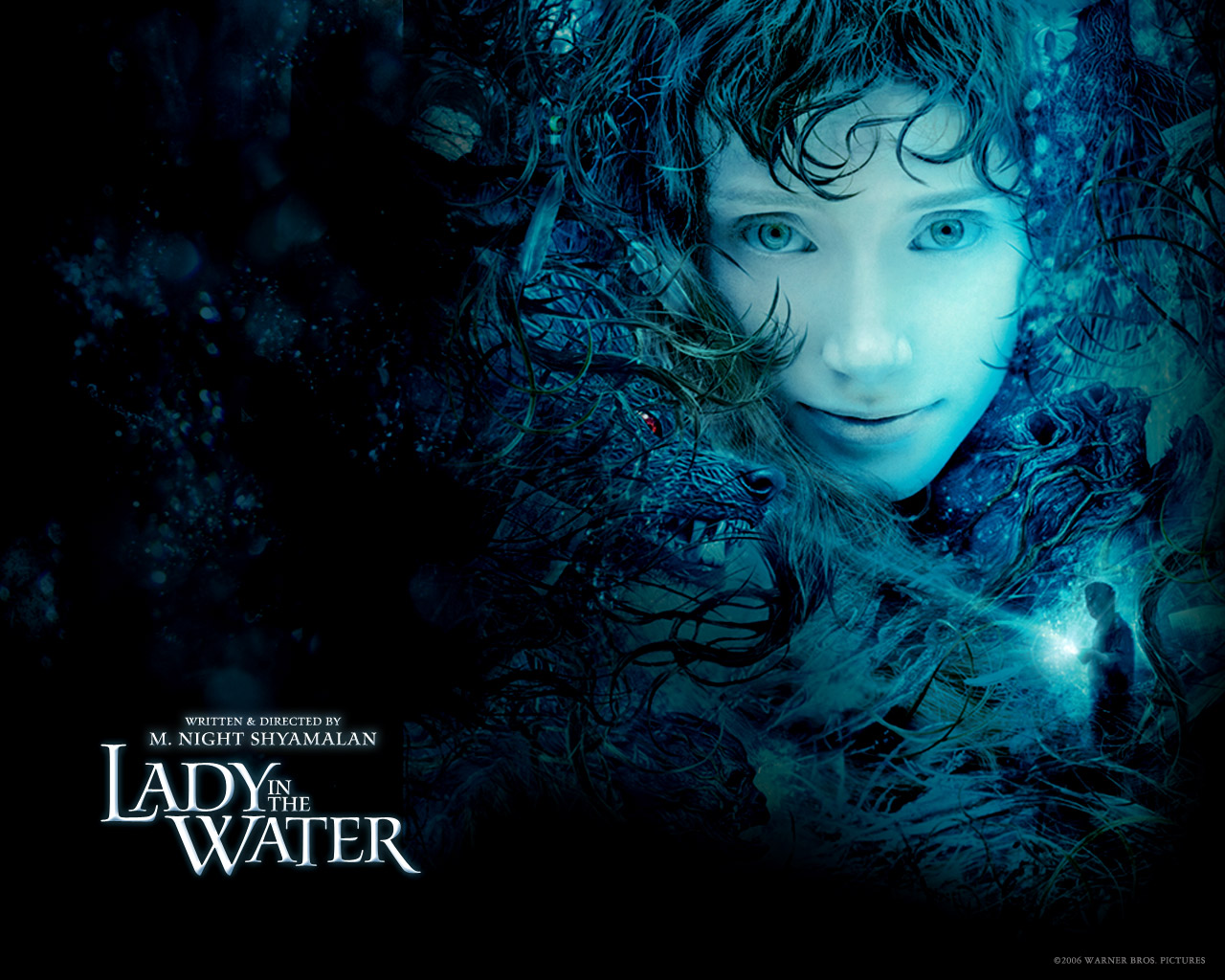
WHY IT IS GOOD: The first thing you have to remember going into this film is that it is a fairy tale. M Night based it off of a bedtime story he told his own children, and compared to his other films this could almost be considered family-friendly. More underrated than it deserves, Lady in the Water is well acted and is a very unique film for Shyamalan to add to his collection. With versatile camera shots and the underlying theme of water and healing, this movie became the subject of the book "The Man Who Heard Voices: Or How M Night Shyamalan Risked His Career On A Fairy Tale". Unlike his other movies, Lady in the Water is not full of small effects that older audiences will appreciate (though there is a subtle reference to the critics who slammed The Village and who he probably knew would slam Lady in the Water). Rather it brings a quiet prize to the fairy tale genre and has its own priceless rings to it. Bryce's angelic face compliments every angle, and Paul Giamatti's fatherly figure who is having trouble healing after the brutal death of his family both bring vibrant life to the screen. So unrealistic that oddly you feel that you are actually living the impossible fairy tale that has come to our world, creative touches such as naming the main character "Story" bring a puff of fresh air to films everywhere. One of my favorite touches is the fact that Cleveland must act like a child in order for the woman to tell him the bedtime story. In the same way, we almost have to look at this movie like children. It is a tale of being able to find wonder and the extraordinary everywhere. Imagine witnessing or being a part of what the characters were: some were incredulous, some scared, some willing and some unwilling, but the truth is, as the line in the film says, the people who were meant to help Story were invariably drawn to the place where she would appear so that they would be able to help her; to save the story. To save the sparks of magic and mystery left in the world, something so ethereal that, in saving her, she saved them.
WHY PEOPLE DON'T LIKE IT: By far the most complained about of the five films I am discussing here, Lady in the Water is constantly thrown under the bus as predictable, boring, and most of all a terrible concept.
I myself will be the first to say that yes, the script probably could have used some work. This is my least favorite of the five films. There were minor plot holes and the animation was bad; some of it seemed as though he was making it up as he went along...
Have you ever had to make up a story to tell your kids at bedtime? I'm sure you just knew everything that was going to happen, right? You didn't have to make anything up as you went along?
He probably could have tweaked it a little, made it a bit more believable. But the truth is, for me anyway, the fact that odd magical things like giant eagles and stick monkeys kept happening pressed the fact that it was a fairy tale for children made into a very pretty film.
Lacking what people were waiting for (a major plot twist and a horror film; again due to marketing and presumption), audiences (especially teens) were disappointed in the lack of violence and scares. Older audiences, however, and those who were mature enough to appreciate the deeper meaning (or those who, like me, came late to the game and learned not to 'expect' anything certain from the director) really did enjoy this film.
Main complaints:
These characters are so unrealistic! Do people really just believe Cleveland when he brings them to a half-naked girl and tells them she's a water nymph? Give me a break! Let me reiterate something; this is a fairy tale. When was the last time you read a "realistic" fairy tale or, quite honestly, any kind of fantasy story at all? One of the things M Night is good at is making you suspend your disbelief and think a little harder; to not take things for granted and watch as the story unfolds. Precious few of M Night's characters are "realistic"; what he does is takes shreds of human nature (Grief, love, healing, etc) and spins a marvelous tale out of it. I suppose some people might have a problem with that, but his movies are meant to be emotional thrillers, not stand-alone dramas.
The script is terrible! Almost every line someone says is an exposition of another element to Story's stupid "Blue World". Ok, as much as I'd like to have a good argument against this, I just don't. He was kind of down on his script writing with this one. Usually bad script writing ruins a film; fortunately this one had too many other redeeming qualities to make it suck. As for the term "Blue World", it is a child's name for the ocean. People say that space is the final frontier, but I think that no one really knows what is in the depths of the ocean. Lady in the Water brings the mystery of the unknown into the forefront - it is far more easy to imagine a water nymph coming up from the unfathomable sea than a dryad from the forest we've all been in before.
Well, we all know what happened next. With The Happening, M Night's policy of minimum violence was broken. With the Last Airbender, Nickelodeon fans everywhere (including me) wanted to lay siege to Hollywood. By the time After Earth came out no one even wanted to speak his name.
What went wrong? Some people say he got a big head. Since he started giving himself larger roles in his movies (and lets face it, he's not the greatest actor even if he is one of the greatest directors) and people praised him as the next Spielberg after the Sixth Sense, maybe his ego took over. Maybe since he became a driving force in Hollywood, he started to pander to the audience's crave for violence. Maybe he tried too hard, or got tired of trying, or ran out of ideas. Many people say he just lost his touch. A favorite past time seems to be to point out all of the problems in his movies since Sixth Sense to discover where he went wrong, instead of looking at the good in the films to find out when he will be back.
But I believe in M Night Shyamalan. You don't just lose a touch like that. Its like being good at football one day and terrible the next, or a good artist on Tuesday and a wretched one on Saturday. Yes, you can make mistakes, but the talent is inside of you. It's what makes the comeback more glorious. He is what made me see the difference between a good film and a great film.
He did it once.
He did it five times.
He can do it again.
He will do it again.
Subscribe to:
Posts (Atom)
